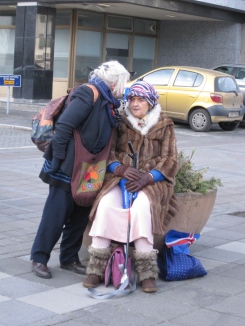At a recent meeting at the independent research institution the Reykjavík Academy the five-year jubilee of the Icelandic demonstrations of the winter of 2008-2009 was commemorated with a discussion about the state of Icelandic democracy. Today the very same question drove around 3,000 people to the Austurvöllur square in front of the parliament. Some brought pots and pans similar to those emblematic of the last demonstrations to join the rhythmic kicking and beating of the fence to gain the attention of the politicians attending the meeting in the parliament.
A video recording from the demonstration was published on the website of the newspaper Vísir: http://www.visir.is/rafmagnad-andrumsloft-a-austurvelli-i-dag—myndband/article/2014140229332
Icelandic media have been overflowing with heated discussion of the question of a referendum about continued negotiations with the EU about Iceland’s possible future entry into the union. Frustration has been expressed from all sides that the government has turned away from the promise that was presented by the Independence Party in its recent campaign without presenting serious alternative political and economical solutions to the current critical state. The criticism that the current government presented of their predecessors was centered around the former government’s hesitation to present the Icesave-matter to the public through a referendum. However, the time after the crash in 2008 seemed to indicated a movement towards increased direct democracy and public influence.
Lately especially the Progressive Party has been criticized for clamping down on critical journalists and scholars; and with the rejection of the increasing public demand for a referendum about the possibility of future negotiations with the EU about membership the government seem to be retreating from the path that was paved by the harsh fundamental debates following the crash.
Some have suggested that the debate – although lengthy and tough – has not touched upon the fundamental ideological issues of the future course of Icelandic politics. Furthermore, scholars and other commentators have called for critical enquiry of the history and fragile state of Icelandic democracy as being necessary for a sustainable solution for the continued journey out of the crisis:
Íris Erlingsdóttir: http://www.huffingtonpost.com/iris-lee/happy-anniversary-iceland_b_302513.html
Sumarlidi Ísleifsson: http://www.opendemocracy.net/article/iceland-self-image-after-crisis
Eiríkur Bergmann: http://bifrost.academia.edu/EirikurBergmann
Jón Sigurdsson, the iconic independence agitator was once again caught in the middle of the events as a metonymical symbol of the narrative that may be at the heart of the dispute: the importance of independence in Iceland. Eiríkur Bergmann and the cultural historians of Denmark and the New North Atlantic are some of scholars who are pointing to the fact that the historical narrative of independence is at best influencing and at worst overshadowing political judgement in Icelandic foreign policy.
This woman was using her home-made sign to advertise for honest politicians while others brought signs displaying “Not my government” and “What about the children?”.
Austurvöllur is a place loaded with cultural memory and significance to the Icelandic nation. This rock was displayed as a “Monument to Civil Disobedience” by artist Santiago Sierra in 2012. With its placement next to the statue of Jón Sigurdsson this monument illustrates the tension that characterizes the political climate of Icelandic society: the questions that have been ringing since 2008: Where to go now? What other options does Iceland have for a political and economical future? and is Iceland on the way out of or deeper into the crisis?
After the meeting that was carried out during the demonstrations the heads of the governmental parties still stand by their decision to end negotiations with the EU. Birgir Ármannsson chairman of the Foreign Affairs Committee (the Independence Party) has recently stated that he is of the opinion that a referendum would be an unfortunate affair (klúður), as long as the Government and the political majority are opposed to negotiating with the EU. The Prime Minister joined his colleague in the evening news with the statement: „Við viljum ekki ganga í Evrópusambandið og því augljóslega ekki vera í viðræðum við sambandið.“ (We do not want to join the EU and therefore we obviously do not want to enter into negotiations.)













